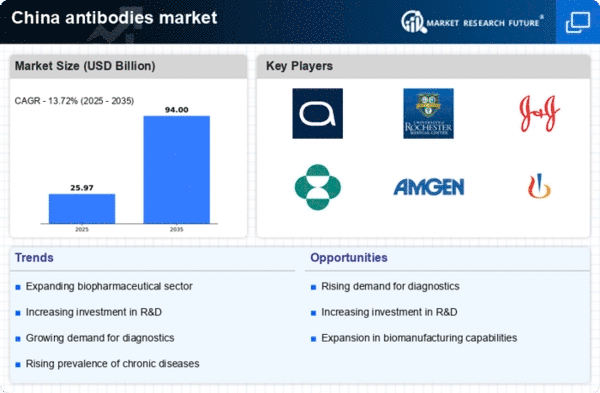Advancements in Biotechnology
Technological advancements in biotechnology are significantly influencing the antibodies market in China. Innovations in monoclonal antibody production, recombinant DNA technology, and high-throughput screening methods are enhancing the efficiency and effectiveness of antibody development. These advancements not only streamline the research and development process but also reduce costs associated with bringing new therapies to market. The Chinese biotechnology sector has seen substantial investment, with funding reaching approximately $10 billion in recent years. This influx of capital is likely to foster a more robust antibodies market, as companies leverage cutting-edge technologies to create novel therapeutic options. The ongoing evolution in biomanufacturing processes further supports the scalability of antibody production, thereby meeting the growing demand.
Growing Public Awareness and Education
The increasing public awareness regarding health issues and treatment options is driving the antibodies market in China. As patients become more informed about the benefits of antibody therapies, there is a growing demand for these treatments. Educational campaigns and outreach programs by healthcare providers are contributing to this trend, highlighting the effectiveness of antibodies in managing various diseases. Surveys indicate that over 60% of patients are now actively seeking information about advanced treatment options, including monoclonal antibodies. This shift in patient behavior is likely to stimulate market growth, as healthcare professionals respond to the demand for more personalized and effective therapies. The antibodies market is thus positioned to benefit from this heightened awareness and patient engagement.
Increasing Prevalence of Chronic Diseases
The rising incidence of chronic diseases in China is a pivotal driver for the antibodies market. Conditions such as cancer, autoimmune disorders, and infectious diseases are becoming more prevalent, necessitating advanced therapeutic solutions. According to recent health statistics, chronic diseases account for approximately 80% of all healthcare expenditures in the country. This trend is likely to propel the demand for therapeutic antibodies, which are increasingly recognized for their efficacy in treating these conditions. The antibodies market in China is projected to grow significantly, with estimates suggesting a compound annual growth rate (CAGR) of around 12% over the next five years. As healthcare providers seek innovative treatments, the antibodies market is positioned to expand in response to these pressing health challenges.
Regulatory Support for Biopharmaceuticals
The regulatory landscape in China is becoming increasingly favorable for the antibodies market. The government has implemented policies aimed at expediting the approval process for biopharmaceuticals, including therapeutic antibodies. Recent reforms have reduced the time required for clinical trials and regulatory approvals, encouraging companies to invest in antibody development. This supportive environment is likely to enhance the competitiveness of the antibodies market, as more products can reach the market in a timely manner. Additionally, the establishment of clear guidelines for biosimilars is expected to further stimulate market growth, providing patients with more affordable treatment options. As regulatory frameworks evolve, the antibodies market is poised for expansion, driven by increased innovation and accessibility.
Rising Investment in Healthcare Infrastructure
China's commitment to improving its healthcare infrastructure is a crucial driver for the antibodies market. The government has been investing heavily in healthcare facilities, research institutions, and biopharmaceutical companies, aiming to enhance the overall quality of care. Recent reports indicate that healthcare spending in China is expected to reach $1 trillion by 2025, reflecting a strong focus on expanding access to advanced medical treatments. This investment is likely to facilitate the growth of the antibodies market, as improved infrastructure enables better distribution and accessibility of antibody therapies. Furthermore, the establishment of specialized research centers dedicated to antibody research is anticipated to accelerate innovation and development within the market.

















Leave a Comment